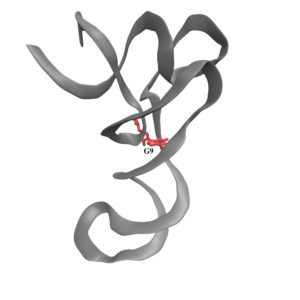OVERVIEW THG1 TRM10
tRNA: Uncommon Enzymes and Unexpected Pathways
Interest in tRNA, the essential adapter molecules for translation of the genetic code into functional protein sequences, has exploded over the past decade, as tRNAs have been implicated in numerous biological processes far and beyond the simple act of translation. My lab is broadly interested in understanding what is now know to be an increasingly more complicated tRNA world. Specifically, we are investigating the chemistry and biology of enzymes that catalyze the addition of diverse chemical functional groups to individual tRNA nucleotides. These enzymes are responsible for creating the highly modified tRNA molecules that are found in all living cells investigated to date.
The projects in the lab revolve around two enzymes, the tRNAHis guanylyltransferase (Thg1) and the tRNA m1G9 methyltransferase (Trm10). Although both enzymes were originally discovered in yeast, our work has expanded to focus on family members from all three domains of life because of additional functions for these enzymes beyond tRNA modification. Both Thg1 and Trm10 share another interesting feature; while their chemical reactions are similar to reactions catalyzed by other well-known families of enzymes, early work suggested that they did not catalyze these reactions in the same way as other well-characterized enzymes. For this reason, we hypothesized that our studies would uncover new enzymology of RNA-related enzymes. We use the tools of mechanistic enzymology (including transient enzyme kinetics), molecular structure and RNA biochemistry to investigate the molecular mechanisms of these enzymes; we are striving to uncover a complete picture of how these unusual enzymes catalyze their reactions. We are also very interested in evaluating the functions of Thg1 and Trm10 in living cells; to do this we use the powerful tools of yeast genetics, and have recently branched out into the slime mold Dictyostelium discoideum, another eukaryotic model system.
